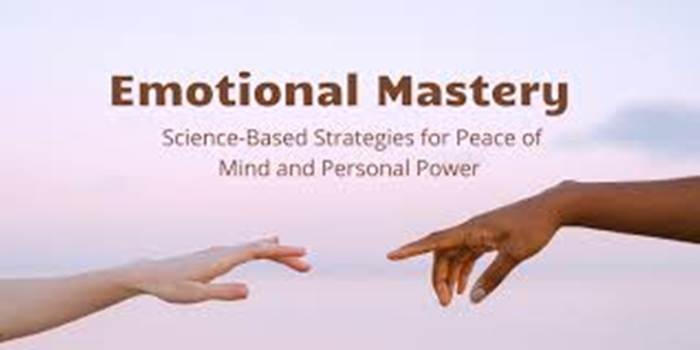In this article, we discussed the meaning of emotional mastery, the features, the benefits, and we also talked about the steps towards emotional mastery.
Definition
Emotional mastery is the ability to understand, regulate, and utilize emotions effectively, rather than being controlled by them. It involves developing emotional intelligence, which encompasses self-awareness, self-management, social awareness, and relationship management. Essentially, it’s about being the master of your emotions, not the other way around.
The Features of Emotional Mastery:
- Self-Awareness: Understanding one’s own emotions and how they influence thoughts and behaviors is fundamental. This includes recognizing triggers, identifying emotional states, and understanding their impact on oneself and others.
- Self-Regulation: The ability to manage and control one’s emotions, even when faced with challenging situations, is a hallmark of emotional mastery. This includes regulating emotional intensity, expressing emotions appropriately, and maintaining composure under pressure.
- Motivation: Having a strong drive and enthusiasm for personal and professional goals, coupled with the ability to overcome challenges and setbacks, is a crucial aspect of emotional mastery.
- Empathy: Understanding and acknowledging the emotions of others is essential for building strong relationships and fostering effective communication. Empathy allows individuals to connect with others on a deeper level and navigate interpersonal dynamics more effectively.
- Social Skills: The ability to communicate effectively, build relationships, and manage conflicts constructively is a vital component of emotional mastery. This involves active listening, clear communication, and the ability to build rapport with others.
The Benefits of Emotional Mastery:
- Improved Relationships:
Enhanced empathy and communication:
Understanding and recognizing emotions in oneself and others fosters empathy and improves communication, leading to stronger connections and more fulfilling relationships.
Conflict resolution:
Emotional mastery equips individuals with the skills to navigate and resolve conflicts constructively, creating a more harmonious environment.
Increased intimacy and trust:
By being more emotionally open and honest, individuals can build deeper and more meaningful connections with others.
- Better Decision-Making:
Reduced impulsive reactions:
Emotional mastery allows individuals to think more clearly and make more rational decisions rather than reacting impulsively to emotional triggers.
Improved problem-solving:
Understanding and managing emotions allows individuals to approach challenges with a more balanced perspective, leading to better problem-solving strategies.
Greater self-awareness:
Knowing one’s emotional triggers and patterns helps individuals make more informed decisions about their lives and goals.
- Enhanced Well-being:
Stress management:
Emotional mastery provides tools for managing stress and anxiety, reducing the negative impacts of stress on physical and mental health.
Resilience:
The ability to cope with difficult emotions and situations builds resilience, allowing individuals to bounce back from setbacks and challenges.
Positive mindset:
By understanding and managing emotions, individuals can cultivate a more positive outlook and find greater meaning and purpose in life.
- Other Benefits:
Increased self-confidence:
Emotional mastery fosters a sense of self-awareness and control, leading to increased self-confidence and self-esteem.
Improved leadership:
Individuals with strong emotional intelligence often make more effective leaders, capable of inspiring and motivating others.
Steps Towards Emotional Mastery:
- Self-Awareness:
Recognize and Name Emotions: Identify the specific emotions you are experiencing (e.g., anger, sadness, anxiety) and give them a name.
Understand Triggers: Become aware of the situations or thoughts that trigger your emotional responses.
Observe Emotional Patterns: Notice how your emotions influence your thoughts and behaviors.
- Emotional Regulation:
Practice Mindfulness: Engage in practices like deep breathing, meditation, or body scans to calm your nervous system and regulate your emotional responses.
Challenge Negative Thoughts: Question the validity of negative thoughts and replace them with more balanced and realistic perspectives.
Express Emotions Healthy Ways: Learn to communicate your feelings in a clear and assertive manner, avoiding harmful behaviors like suppressing emotions or outbursts.
- Building Emotional Resilience:
Self-Compassion: Treat yourself with kindness and understanding, especially during difficult times.
Seek Support: Build a strong network of friends, family, or support groups who can provide empathy and encouragement.
Engage in Enjoyable Activities: Make time for activities that bring you joy and help you relax and recharge.
Seek Professional Help: If you are struggling to manage your emotions on your own, consider seeking therapy or counseling from a qualified professional.
- Continuous Practice and Refinement:
Keep a Mood Journal: Track your emotions, triggers, and coping strategies to gain insights into your emotional patterns.
Learn from Experiences: Reflect on your emotional experiences and identify areas for improvement.
Be Patient and Persistent: Developing emotional mastery is a journey, not a destination. Be patient with yourself and celebrate your progress.
Conclusion
Emotional mastery refers to the ability to recognize, understand, and effectively manage one’s emotions, rather than being controlled by them. It involves developing resilience, emotional intelligence, and the capacity to respond to challenges with wisdom and grace ,while maintaining a sense of control over one’s emotional state.


